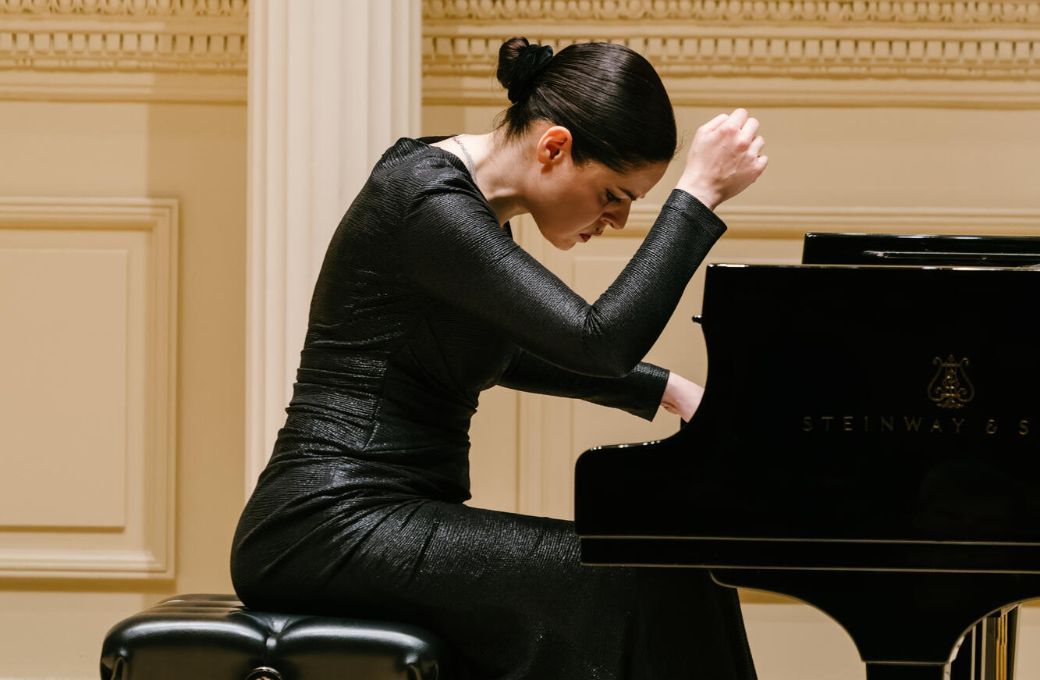Born in Moscow and now based in Berlin, Zlata Chochieva rose to prominence through luminous recordings of Rachmaninov and Chopin. Celebrated for her tonal finesse and interpretive depth, she made her long-overdue debut at Carnegie Hall’s Weill Recital Hall in a programme designed to be as poetic as it was formidable.

It was an evening of two incongruent halves. Chochieva began with Bartók’s transcription of the Lento from Bach’s Organ Sonata no. 6, which felt unexpectedly weighty and over-pedalled, lending the music a ponderousness at odds with its airy trio-sonata origins.
Purposefully following without any cesura, Schumann’s Études symphoniques continued in the same heavy-voiced register. A cornerstone of the composer’s piano writing, it’s all too easy for the piece to come undone in performance if its volatility and sudden mood shifts aren’t fully embraced. This reading never quite captured the mercurial essence – the tension between lyrical introspection and impulsive outburst – that gives the cycle its emotional charge. It wasn’t that the playing lacked feeling, but rather that it resisted volatility.
The dotted rhythms of the opening étude were dispatched firmly but without urgency, and the slower variations, for all their careful voicing, remained grounded. The etched elegance of the quieter posthumous variations lacked vulnerability, while the sixth's surging energy fell short of the necessary abandon. Even in the grand Allegro brillante finale, where Chochieva summoned considerable power, the sense of culmination felt strangely withheld.
From there on, it was all upwards. What was missing in Schumann started to emerge in the two Brahms pieces that followed, forming a striking diptych. The Romance in F major, one of Brahms’ last piano works, unfolded with warmth and introspection, yet the long lines not sufficiently imbued with autumnal melancholy. The Scherzo in E flat minor, by contrast, is an early work – bold, restless and surging with adolescent intensity. Chochieva met its demands with unflinching precision and bite, capturing its volatile temperament without sacrificing clarity.
The second half, devoted entirely to Rachmaninov, brought Chochieva into her element. A sequence of eight preludes, drawn from Opp.23 and 32, revealed a pianist more at ease, more attuned to the nuances of mood and colour. The D major Prelude flowed with natural lyricism, its long melodic lines shaped with sensitivity over of an underlying haze. In the darker miniatures – the C minor with its relentless almost hypnotic ostinato, the elusive E flat minor – Chochieva's control never wavered, even as textures thickened. The G flat major unfolded like a Schumann-esque reverie, while the G major glimmered with clarity and charm.
The Corelli Variations, a score that can feel long-winded, unfolded with lucidity and control, Chochieva avoiding any sense of drift while drawing out the individual character of each variation. She brought rhythmic definition to the fifth, emphasised the bell-like toll of the thirteenth, shaped the tenth with sardonic charm, and rendered the fifteenth as a strand of fragile ornamentation. The Intermezzo was duly introspective, its improvisatory thread quietly sustained. Though emotionally restrained, the reading maintained coherence and balance, affirming Chochieva’s structural grasp of this elusive work.
After a brisk take on Rachmaninov’s slight arrangement the Scherzo from Mendelssohn’s A Midsummer Night’s Dream, Chochieva marked the composer’s birthday with a taut, unsentimental encore: the Étude-Tableau, Op.39 no.6. Its implacable drive and doom-laden ascent confirmed that Rachmaninov’s steadier, more assured strain of Romanticism – especially in contrast to Schumann’s – brought out the best in her playing.


